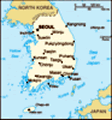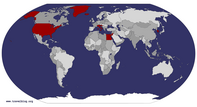Advertisement
Published: February 8th 2018
I'm still sick. On Tuesday I called the USOC boss and she told me to come in to see the USA doctor. Unfortunately that entails a 40 minute bus ride on a "too warm" bus. Going from a warm dormitory to cold air to a warm bus triggers my coughing every time. The USA personnel examined me and felt it was better to see the other doctor at the other village (GVL - back closer to where I live). Apparently the doctor at PVL is an ortho doctor and wouldn't be there till the afternoon, and the doctor at GVL is internal medicine, so off I go for a 30 minute bus ride to GVL, and another coughing fit.
The doctor at GVL did a thorough exam and wanted some tests done. He did a throat swab which was negative for strep. He heard a heart murmur, which I had been told about 5 years ago but they said it wasn't serious. Technically the medicine they have at the USA Sports Medicine office is for the athletes so he had to send me to the Polyclinic and requested a chest x-ray & neubulizer treatment. The Korean doctor at the Polyclinic
heard something in my lungs (bronchial noises), but the chest x-ray was normal. She prescribed steroids for 2 days, antibiotics, antihistamines, ventolin inhaler and lots of rest. I took a cab home because I didn't want to stand out in the cold waiting for a bus. This whole procedure took from 9:30 to 17:00 hours.
Thank you all for your comments and well wishes for me to get better.
Some of you have heard about the Norovirus also infecting people here. The security people have norovirus (diarrhea & vomiting, also known as the "cruise vessel virus") and were quarantined and replaced with military people.
Finally, here are some pictures taken by another American volunteer of the Welcome Ceremony for Team USA. I was supposed to hold the USA sign & lead the athletes to the welcome ceremony, but I cannot be around any athletes while sick.
Here's a New York Times article that you may find interesting. PyeongChang is the mountain cluster: skiing, snowboard, luge, bobsled, skeleton.
Pyeongchang’s Winding Path From Obscurity to Olympics Fame By
CHOE SANG-HUNFEB. 3, 2018

The Pyeongchang Olympic Stadium will hold the opening and closing
ceremonies of the 2018 Winter Games. Credit Ed Jones/Agence France-Presse — Getty Images
PYEONGCHANG, South Korea — Lee Ji-seol was in elementary school when her hometown, Pyeongchang, first applied to host the Winter Olympics. During a visit by Olympic officials, she recalled, her entire class lined up on a street to cheer and wave flags.

By The New York Times
Their enthusiasm notwithstanding, the bid hardly seemed promising. Located 50 miles from North Korea and the world’s most heavily fortified border, Pyeongchang was known mainly as a mountain backwater that produced potatoes and cattle. The town center was a nondescript crossroads, going to seed with “love motels” and karaoke bars. The area boasted two ski resorts, but they struggled to muster enough snow to attract visitors.
That first bid for the 2010 Games failed, as did a second bid to host in 2014, but the International Olympic Committee finally gave Pyeongchang, population 43,000, the nod for the 2018 Winter Games, which open next week. It was a victory for those who never stopped believing in the obscure little town, one of the most unlikely hosts of the Games in Olympic history.
“The entire
town was out dancing,” Ms. Lee, 22, said of the day they heard the news. “Before we started our Olympic campaign, few South Koreans, much less any foreigners, even knew we existed.”

A South Korean security team went through an antiterrorism drill outside the Olympic Stadium in December. Credit Jeon Heon-Kyun/European Pressphoto Agency
Pyeongchang’s obstacles were both economic and physical. It is one of the poorest places in Gangwon, South Korea’s most isolated and least developed province, which shares a long border with the North. And though it is just 80 miles from Seoul, getting to Pyeongchang from the capital used to take hours on mountain roads that twist like “a sheep’s intestines,” as the locals say.
The provincial governor, Choi Moon-soon, called it “the last place the government thought of when it thought of investment,” adding, “We hoped an Olympics would change that.”
Even the town’s name was a problem. Originally spelled “Pyongchang” in English, it was often confused with Pyongyang, the capital of North Korea. So in 2000, the town added a letter, capitalized another and changed its name to “PyeongChang,” though most foreign news agencies declined to use the capital C.
Despite the rebranding, a Kenyan man registered to attend a United Nations meeting in Pyeongchang in 2014 made headlines after he
flew to Pyongyang by mistake.

Visitors leave messages of hope at the DMZ Museum in Gangwon Province, which lies on the border with North Korea. The province will host the Winter Games in Pyeongchang, another part of regional efforts to turn its proximity to the North into a tourist attraction. Credit Jeon Heon-Kyun/European Pressphoto Agency
In time, though, South Korea embraced Pyeongchang’s bid for the Games as its own. The nation’s leaders were eager to build global prestige and saw the Winter Games as a chance to become one of only a handful of countries that have hosted a “trifecta” of international sports events. (The World Cup took place in South Korea and Japan in 2002, and Seoul hosted the Summer Games in 1988.)
In a country where winter sports never quite caught on, only one other town with ski slopes, Maju, was interested in hosting the Olympics. Pyeongchang edged it out for national support, perhaps because it sits in a province that has been a major electoral battleground.
The government has poured $13
billion into the region, building a new bullet train and highway — and 97 tunnels and 78 bridges — to improve access to Pyeongchang from Seoul, as well as sporting facilities such as ice rinks and ski slopes.
While some residents worried about the impact on local forests, support for the Olympic bid has been almost universal in Pyeongchang: A poll taken at the time of the first bid showed nearly 94 percent support, and it has not wavered.

A view from the Unification Observatory, a hilltop lookout in Gangwon Province where visitors can peer at North Korea less than a half-mile away. Credit Jeon Heon-Kyun/European Pressphoto Agency
Many believe the area’s future lies in bolstering tourism and are hopeful the Winter Games will help. The service sector already accounts for 70 percent of the local economy, in part because of vacationers drawn to the province’s scenic coast. But inland Pyeongchang has not really benefited; it’s betting that the Olympics will change that.
In lobbying for its bid, South Korea used a potential handicap — Pyeongchang’s proximity to the North Korean border, in a region bristling with troops and weaponry — as a selling
point. Holding the Games in Pyeongchang, officials argued, would promote peace between two nations still technically at war.
The North did agree
to send 22 athletes to the Games, and the two countries
agreed to field a joint women’s ice hockey team.
A third of South Korea’s 600,000 military personnel are based in Gangwon Province. Many who were posted here as conscripts — all men in South Korea are required to serve about two years in the military — say they never want to see it again, so rugged are its hills and cold its winters.

A South Korean soldier at the Unification Observatory last month. A selling point for Pyeongchang’s bid for the Olympics was that it would promote peace. Credit Jeon Heon-Kyun/European Pressphoto Agency
Suspicion of North Korea is deeply etched here, as nowhere else in South Korea. The mountainous border is scarred with barbed wire, tank traps, land mines and guard posts. Hilltop
loudspeakers blare K-pop songs daily toward the North, which counters by
sending propaganda leaflets floating on balloons into the South.
Dreams of easing tensions and reunifying with the North one day are also more acutely felt here than anywhere else in South Korea. Many older people in the area came from the North as war refugees,
settling near the border in hopes of returning quickly once the Koreas were reunified.
”Our dream is to one day take the train to go to North Korea and all the way across Siberia and to Berlin,” said Noh Yeon-su, curator of the DMZ Museum, referring to roads and rail lines that stop at the border, essentially making South Korea an island.
The province is also home to the so-called
Peace Dam, a towering structure built on the Han River because of fears that another dam upstream in North Korea might release a killer flood, by accident or on purpose.
And it was in nearby Gangneung, where the ice hockey and speedskating events are scheduled to be held, that a North Korean submarine ran aground in 1996. Twenty-six crewmen and agents spilled out, setting off a huge manhunt in the area.
But Mr. Choi, the governor, shrugs off such concerns.
“Those of us who live here are not afraid of North Korea because the North, despite all its missile tests and bombast, doesn’t have an ability to fight a war,” he said. The economic output of his province, the South’s poorest, he noted, exceeds that generated

 Welcome Ceremony 9
Welcome Ceremony 9
I was supposed to hold the USA sign.by all of North Korea.
He added, “The happiest thing about the Olympics is that when foreigners see the Games taking place here, we can shake off our stigma as a dangerous place.”
Till next time,
Sue
Advertisement
Tot: 0.237s; Tpl: 0.014s; cc: 8; qc: 52; dbt: 0.1368s; 1; m:domysql w:travelblog (10.17.0.13); sld: 1;
; mem: 1.2mb

















Pat Collins
non-member comment
ceremonial outfits
Those are quite the ceremonial outfits the Koreans are wearing. I heard on the news tonight about the virus going around. Yours sounds like upper respiratory rather than the other intestinal. Hope you recover quickly to be able to enjoy the Olympics.